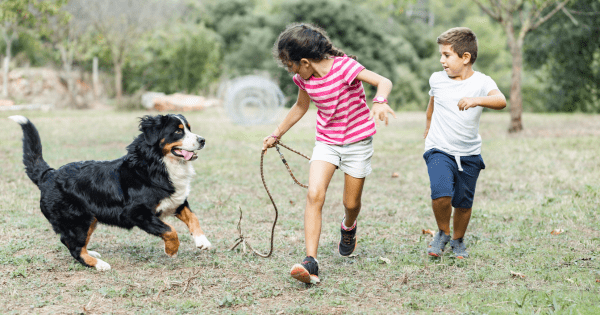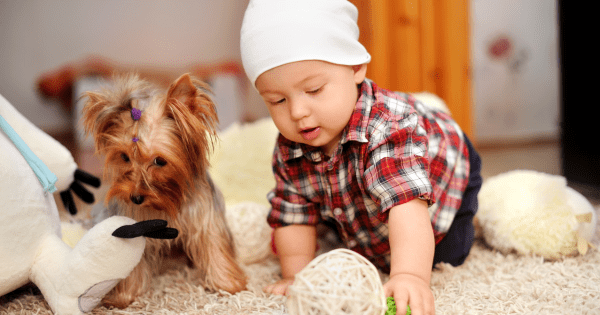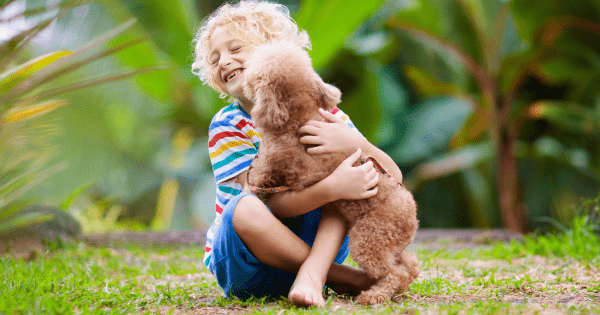Dogs have long been known as “man’s best friend,” but their role extends far beyond mere companionship. For families, owning a dog can significantly enrich life, especially for children. From fostering emotional well-being to encouraging responsibility, the advantages of having a dog in a household are profound. Whether you’re considering adding a furry friend to your family or you’re curious about the benefits, this article explores the multitude of ways owning a dog can positively impact kids and families.

Emotional and Psychological Benefits for Children
Owning a dog can have profound effects on a child’s emotional and psychological development. Many studies have shown that children who grow up with pets tend to be more empathetic, responsible, and emotionally secure.
1. Building Empathy and Compassion
One of the primary emotional benefits of having a dog is that it teaches children empathy and compassion. Caring for a pet encourages children to consider the needs of another living being. Feeding, grooming, and walking the dog provide practical opportunities for kids to understand the importance of kindness and care for others. Dogs also respond to human emotions, which helps children develop an understanding of how their actions affect those around them.
2. Emotional Support
Dogs provide unconditional love and comfort, making them wonderful emotional support companions for children. Many kids confide in their dogs when they feel sad, lonely, or stressed, knowing that their pet will listen without judgment. This emotional bond can help alleviate feelings of anxiety and provide comfort during challenging times, such as a move to a new home or starting a new school.
3. Boosting Self-Esteem
A dog can also boost a child’s self-esteem. Caring for a pet gives children a sense of responsibility and accomplishment, as they take on tasks like feeding or walking their dog. Successfully performing these duties helps build confidence and fosters a sense of achievement. Additionally, the unconditional affection of a dog can make children feel valued and loved, further contributing to their sense of self-worth.
4. Reducing Anxiety and Stress
Dogs are known to have a calming effect, which can be especially beneficial for children who struggle with anxiety or stress. Petting a dog can lower blood pressure and release feel-good hormones like oxytocin, which reduces stress levels. Many therapy dogs are trained to provide comfort to children in hospitals, schools, and therapy settings, demonstrating the powerful emotional support dogs can offer.

Physical Benefits of Owning a Dog
In addition to the emotional and psychological benefits, owning a dog can promote physical well-being for children and families. Dogs encourage more active lifestyles, support healthy habits, and can even improve immune systems.
1. Encouraging Physical Activity
One of the most obvious benefits of owning a dog is the increased physical activity it encourages. Walking, running, and playing fetch with a dog gets kids and families outside and moving. According to the American Heart Association, dog owners are more likely to meet daily exercise requirements compared to non-pet owners. Regular physical activity promotes a healthy lifestyle for both children and adults, helping to combat childhood obesity and sedentary habits.
2. Supporting Healthy Routines
Dogs require regular care, including feeding, walks, and grooming, which can help families establish and maintain healthy routines. Children learn the importance of sticking to a schedule, and families often find themselves organizing their days around their dog’s needs. Having a set routine for exercise and care not only benefits the dog but also instills discipline and structure in children’s lives.
3. Strengthening the Immune System
Interestingly, studies suggest that growing up with a dog can improve a child’s immune system. Children exposed to pets from a young age tend to have stronger immune responses, resulting in lower rates of allergies and asthma. The presence of a dog in the home introduces various microbes, which helps strengthen children’s immune systems as they grow. This early exposure can lead to fewer illnesses, especially in younger children.
Social Benefits of Owning a Dog
Dogs are natural social connectors, helping families meet new people and strengthening bonds within the family unit. Whether through playdates at the park, neighborhood walks, or community events, dogs provide ample opportunities for socialization.
1. Improving Social Skills in Children
For shy or introverted children, owning a dog can be an excellent way to improve social skills. Dogs act as social icebreakers, making it easier for kids to start conversations with other dog owners or children. Additionally, dogs help children learn how to interpret non-verbal cues, an essential part of social communication. Understanding a dog’s body language and emotional state can help children become better at reading social situations and interacting with people.

2. Promoting Family Bonding
Dogs have a remarkable ability to bring families closer together. From taking walks as a family to playing games in the backyard, a dog often becomes a central part of family activities. These shared experiences create lasting memories and strengthen familial bonds. Additionally, working together to care for the dog teaches teamwork and collaboration, as family members divide responsibilities like feeding, bathing, and walking.
3. Providing Opportunities for Social Interaction
For parents, owning a dog often leads to increased social interaction within the community. Dog parks, training classes, and neighborhood walks provide opportunities to meet other dog owners and form new friendships. Children, too, benefit from these interactions, as they meet other kids who share a love of dogs. These social connections can enrich family life and foster a greater sense of community.

Teaching Responsibility and Life Skills
One of the most valuable lessons a dog can teach children is responsibility. Caring for a pet requires daily commitment and effort, and children who take on these tasks learn essential life skills.
1. Instilling Responsibility in Children
Taking care of a dog involves a variety of responsibilities, such as feeding, walking, cleaning up after, and ensuring the dog’s health and safety. When children are assigned these tasks, they learn the importance of caring for another living being. This responsibility helps prepare them for future roles in life, such as caring for themselves, family members, or others.
2. Developing Time Management Skills
Owning a dog requires children to manage their time effectively. They must learn how to balance their pet care duties with school, homework, and playtime. Managing these responsibilities teaches time management and prioritization, valuable skills that will serve them throughout their lives.
3. Learning About Compassion and Commitment
Having a dog provides a practical example of long-term commitment. Children learn that pets are not temporary or disposable but require ongoing care and attention. This teaches children the importance of compassion and dedication, as they understand the responsibility of meeting the dog’s needs throughout its life.

Long-Term Benefits of Dog Ownership for Families
Owning a dog provides both immediate and long-term benefits for families. As children grow, the lessons they’ve learned from caring for a dog stay with them, influencing their personal and social development well into adulthood.
1. Fostering Lifelong Compassion for Animals
Children who grow up with dogs often develop a deep respect and compassion for animals. This early exposure to the responsibility of caring for a pet can lead to a lifelong appreciation for animal welfare, encouraging them to become advocates for animals as they grow older.
2. Creating Cherished Family Memories
The bond formed between a family and their dog often results in countless cherished memories. From the first day a puppy comes home to years of shared adventures, these moments leave a lasting imprint on family life. Many adults reflect on their childhood pets with fondness, remembering them as an integral part of their upbringing.

3. Strengthening the Family Unit
The shared responsibility of caring for a dog strengthens the family unit. As family members work together to meet the needs of their pet, they develop a sense of teamwork and mutual support. Dogs often become a source of joy and laughter in the home, helping to create a positive, loving atmosphere.
Conclusion
Owning a dog offers a multitude of benefits for kids and families, from emotional and psychological growth to fostering responsibility and social skills. The unconditional love and companionship a dog provides enrich the lives of everyone in the household. Whether through promoting physical activity, teaching valuable life lessons, or strengthening family bonds, dogs play a crucial role in the well-being and happiness of families. For those considering adding a furry friend to their home, the benefits are clear: a dog can bring immense joy, love, and positive development into family life.
READ NEXT: Adopting a Rescue Dog: What You Need to Know